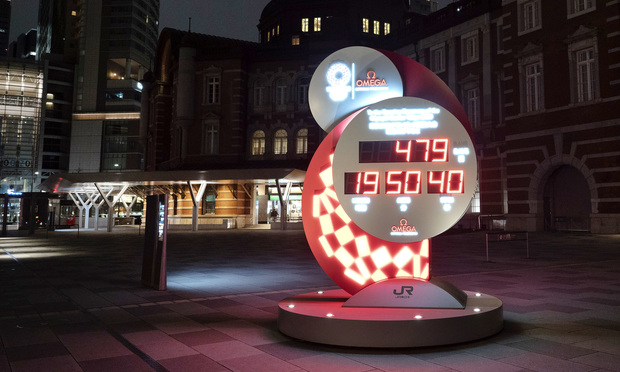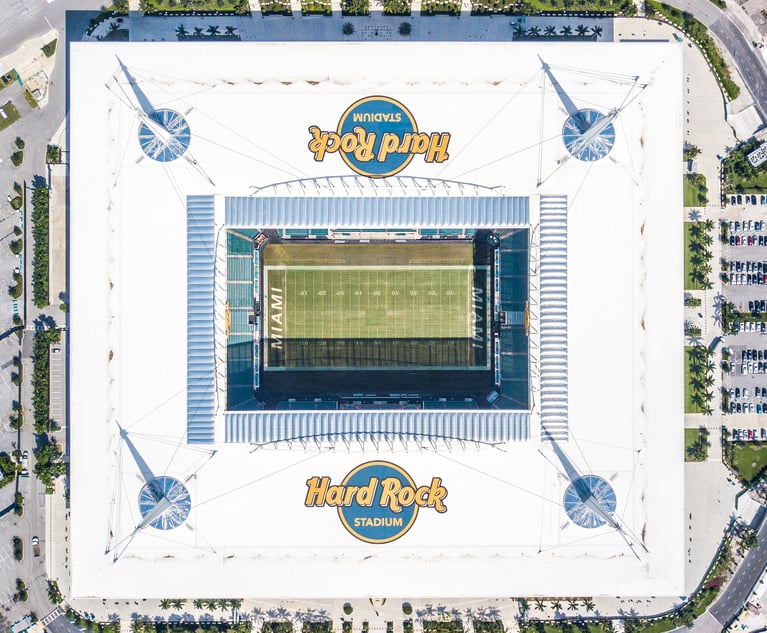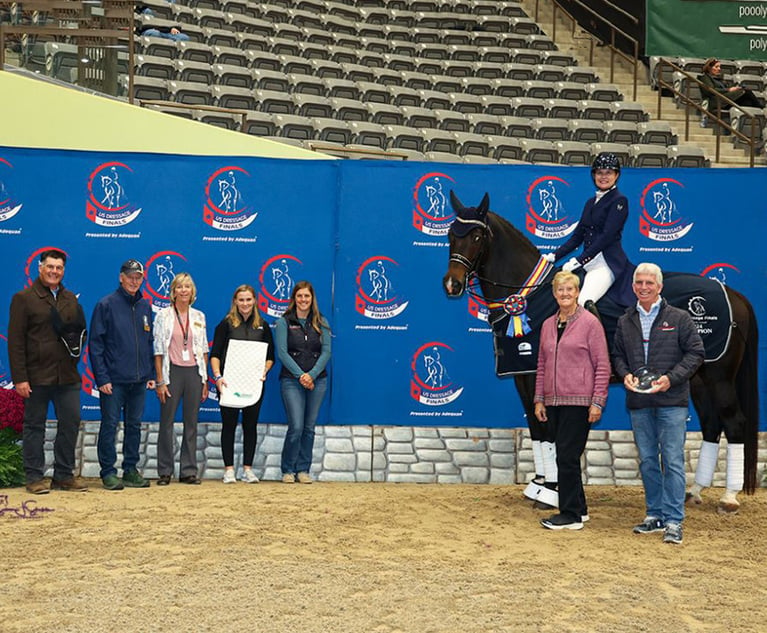With Pros and Olympics Delayed, Sports Lawyers Plot Out the Long Game for Their Practices
While some sports-related work will slow, lawyers will be called in to broker cooperation in rescheduling major athletic competitions.
March 31, 2020 at 12:34 PM
6 minute read
 A countdown clock displays the remaining days until the new start date for the Tokyo 2020 Olympics on Tuesday in Tokyo. AP Photo: Jae C. Hong
A countdown clock displays the remaining days until the new start date for the Tokyo 2020 Olympics on Tuesday in Tokyo. AP Photo: Jae C. Hong
The first domino to fall was the suspension of the NBA season. Shortly after, the NCAA Men's Basketball Tournament was nixed. MLB's spring training was shortened, then the season delayed. And now, the 2020 Summer Olympics in Tokyo have been pushed to 2021.
While every industry is dealing with massive upheaval, few are as visible as sports and entertainment. While many who practice in this area anticipate a slowdown in overall legal work, certain pockets of work are being pushed to the forefront, creating demand for the services these attorneys provide.
Steve Smith, managing partner of Bryan Cave Leighton Paisner's Colorado Springs, Colorado, office and partner in the firm's sports law practice, said he is anticipating a slowdown in work, but not a huge one.
"I'm sort of expecting a bit of a downturn, but the nice thing of being in the legal profession is that if things are good, people are doing more deals," Smith said in an interview. "If things are down, they need help to make things work. That's the benefit we have."
Michael Kuh, a New York-based partner at Hogan Lovells who has worked with Olympic committees and major sports franchises, said there has been a slight decrease in work at his practice. But more so, he's just been focusing on different issues.
"I've been spending time advising clients as they think through health and safety issues for their employees and remote deployment," Kuh said, "and more recently about what federal and state benefits may be available to them."
Kuh said he expects legal work surrounding sponsorship expansions and new ventures to come to a standstill, but contract review work to increase. Thus far, Kuh said, everyone has been playing the long game when it comes to handling matters, noting that relationships are king in the sporting world.
"They are working cooperatively with one another to make it through to the next day," Kuh said. "We have not seen—not yet anyway—any real uptick in clients taking adversarial positions."
While three of the four major American sports leagues are dealing with some degree of delay in their seasons (the NFL, as of yet, has not postponed the start of its 2020 season), the biggest news of late was the announcement that the 2020 Olympics have been postponed until 2021.
Bryan Cave's Smith, who represents international federations and national governing bodies in the Olympic movement, said he was not surprised the games were moved to next year.
"It's easy to be critical, and maybe they waited a bit too long to make the decision," Smith said. But "I don't have complaints about how they handled it. It isn't a U2 concert that you can just move to a later date."
Jon Israel, New York-based partner at Foley & Lardner and co-chair of the firm's sports industry practice, said the number of issues that will need to be sorted out regarding the Olympic postponement should create a lot of work for sports attorneys.
"What do you do with the athletes who have trained so hard?" he said. "How do you do qualifying events? Sponsors are all lined up. What happens with them?"
Smith said that the force majeure clause in contracts, normally an afterthought during the negotiation process, is now in full view.
Force majeure is "historically one of the least paid-attention-to clauses," Smith said. "Not now."
While there are sure to be numerous negotiations around how sponsors, athletes, governing bodies and the host city and country are to be made whole, Smith, like Kuh, said if his dealings with other entities around contract renegotiations are any indication, he expects that everyone will play nice and be understanding.
"People are being pretty reasonable about it," he said. "They know the Olympics can't be done this year, so let's make this work for 2021. Fortunately people are being realistic about it. They realize they will have to do business with these people again."
The games, now slated to begin July 23, 2021, will cost an additional $3 billion to $6 billion dollars, according to a report from ESPN.
Sifting through the various sponsorship contracts, totaling over $3.3 billion and more than twice that of previous Olympics, will require lawyers. Broadcasting rights and renegotiation over such things as use of the Olympic Village, built to house over 11,000 athletes in apartments that were to be sold after the games, will create more legal work.
Smith estimated that the Olympic governing bodies in the U.S., of which there are 45, will lose an estimated $120 million, leading him to wonder whether those organizations will be able to recoup the loss or simply write it off.
Israel, of Foley & Lardner, mentioned that the fallout from cancellations hits not only the sports leagues and teams, but the ecosystem of venues, retailers, restaurants and bars and people that work in the arenas.
Some changes to the sporting world already in progress, such as the rising popularity of esports, might have their flames fanned by the current ban on large gatherings, a key component of sporting events.
But Israel believes that, in time, a return to sport will see fans back in the stands.
"Habits will change from these circumstances," Israel said. "We will probably see more of an online consumer of sports. But nothing can replicate the stadium experience. That stuff will never go away."
Read More
US Soccer Taps Latham After Arguing Women Players Are Less Skilled Than Men
Foley Bets On Sports Practice, Lands Ex-Jets GC
This content has been archived. It is available through our partners, LexisNexis® and Bloomberg Law.
To view this content, please continue to their sites.
Not a Lexis Subscriber?
Subscribe Now
Not a Bloomberg Law Subscriber?
Subscribe Now
NOT FOR REPRINT
© 2025 ALM Global, LLC, All Rights Reserved. Request academic re-use from www.copyright.com. All other uses, submit a request to [email protected]. For more information visit Asset & Logo Licensing.
You Might Like
View All
Wachtell Helps Miami Dolphins Secure One of NFL’s First Private Equity Deals
3 minute read
'It Refreshes Me': King & Spalding Privacy Leader Doubles as Equestrian Champ
5 minute readLaw Firms Mentioned
Trending Stories
- 1Am Law 200 Firms Announce Wave of D.C. Hires in White-Collar, Antitrust, Litigation Practices
- 2K&L Gates Files String of Suits Against Electronics Manufacturer's Competitors, Brightness Misrepresentations
- 3'Better of the Split': District Judge Weighs Circuit Divide in Considering Who Pays Decades-Old Medical Bill
- 4Which Georgia Courts Are Closed Today?—Here's a List
- 5After DEI Rollbacks, Employment Lawyers See Potential For Targeting Corporate Commitment to Equality
Who Got The Work
J. Brugh Lower of Gibbons has entered an appearance for industrial equipment supplier Devco Corporation in a pending trademark infringement lawsuit. The suit, accusing the defendant of selling knock-off Graco products, was filed Dec. 18 in New Jersey District Court by Rivkin Radler on behalf of Graco Inc. and Graco Minnesota. The case, assigned to U.S. District Judge Zahid N. Quraishi, is 3:24-cv-11294, Graco Inc. et al v. Devco Corporation.
Who Got The Work
Rebecca Maller-Stein and Kent A. Yalowitz of Arnold & Porter Kaye Scholer have entered their appearances for Hanaco Venture Capital and its executives, Lior Prosor and David Frankel, in a pending securities lawsuit. The action, filed on Dec. 24 in New York Southern District Court by Zell, Aron & Co. on behalf of Goldeneye Advisors, accuses the defendants of negligently and fraudulently managing the plaintiff's $1 million investment. The case, assigned to U.S. District Judge Vernon S. Broderick, is 1:24-cv-09918, Goldeneye Advisors, LLC v. Hanaco Venture Capital, Ltd. et al.
Who Got The Work
Attorneys from A&O Shearman has stepped in as defense counsel for Toronto-Dominion Bank and other defendants in a pending securities class action. The suit, filed Dec. 11 in New York Southern District Court by Bleichmar Fonti & Auld, accuses the defendants of concealing the bank's 'pervasive' deficiencies in regards to its compliance with the Bank Secrecy Act and the quality of its anti-money laundering controls. The case, assigned to U.S. District Judge Arun Subramanian, is 1:24-cv-09445, Gonzalez v. The Toronto-Dominion Bank et al.
Who Got The Work
Crown Castle International, a Pennsylvania company providing shared communications infrastructure, has turned to Luke D. Wolf of Gordon Rees Scully Mansukhani to fend off a pending breach-of-contract lawsuit. The court action, filed Nov. 25 in Michigan Eastern District Court by Hooper Hathaway PC on behalf of The Town Residences LLC, accuses Crown Castle of failing to transfer approximately $30,000 in utility payments from T-Mobile in breach of a roof-top lease and assignment agreement. The case, assigned to U.S. District Judge Susan K. Declercq, is 2:24-cv-13131, The Town Residences LLC v. T-Mobile US, Inc. et al.
Who Got The Work
Wilfred P. Coronato and Daniel M. Schwartz of McCarter & English have stepped in as defense counsel to Electrolux Home Products Inc. in a pending product liability lawsuit. The court action, filed Nov. 26 in New York Eastern District Court by Poulos Lopiccolo PC and Nagel Rice LLP on behalf of David Stern, alleges that the defendant's refrigerators’ drawers and shelving repeatedly break and fall apart within months after purchase. The case, assigned to U.S. District Judge Joan M. Azrack, is 2:24-cv-08204, Stern v. Electrolux Home Products, Inc.
Featured Firms
Law Offices of Gary Martin Hays & Associates, P.C.
(470) 294-1674
Law Offices of Mark E. Salomone
(857) 444-6468
Smith & Hassler
(713) 739-1250












